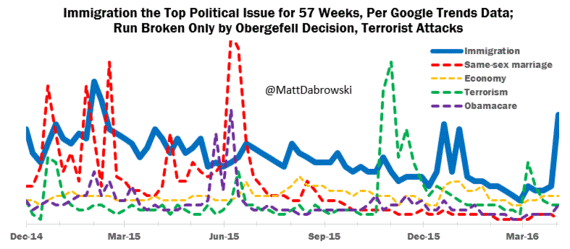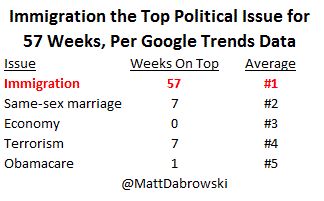The top issue of the 2016 Republican primary hasn't been taxes and spending, income inequality, or even the economy; it's been immigration. Google search data, which reflects a snapshot of actual voter behavior, shows that immigration has been the top campaign issue for 57 of the past 72 weeks going back to December 2014. It goes without saying that Donald Trump has dominated the hardline position on this issue and, like many an insurgent candidate throughout history, Trump has capitalized on what the polls have missed. That makes Google data a key metric to watch going into the fall campaign.
What are the most important issues in a political campaign? As Donald Trump has risen to the top of the Republican primary field, pundits have speculated especially on what motivates his supporters, and what it may mean for the future of American politics.
Pollsters are certainly interested in this as well, and the 'most important issue' question is a staple of political polling. There are a few popular ways to ask the question, such as:
Year in and year out, the top response is almost always "jobs and economy." The recent exception was a stretch during the post-9/11 era when "national security" and "the war in Iraq" took over. (The fact that "jobs and the economy" is the preferred wording, and that it almost always tests pretty well, is why you often hear candidates use that exact formulation in their stump speeches: "This campaign is about jobs and the economy.")
Pollsters and political scientists even have a technical term for this idea of the most important issue in voters' minds: salience.
Why Salience Matters, and How The Polls Miss It
To a certain extent, all politics revolves around this idea of salience. And the cutting edge of campaign techniques -- think of microtargeting, propensity modeling, and the like -- uses advanced statistics to tease out the salient issue for each individual voter.
But for public opinion researchers and campaign strategists, the problem with the 'most important issue' question is that it doesn't seem to change much in response to events. "Jobs and the economy" has led the polls continuously since at least 2008. Meanwhile, private-sector job base has grown for six straight years and the stock market has gained 200% over its 2009 lows. If this question were always a reliable and valid measure of concern about the real economy, the data would demonstrate at least some fluctuation in response to positive change in the economic data.
So if the 'most important issue' question misses some part of the picture, how can we know what issues are getting the most attention? Analysts and academics are turning to Google search data. Since this data reflects actual voter behavior -- the act of searching itself -- it offers another snapshot of public opinion. For this year's Republican primary, Patrick Ruffini was the first to look at Google Trends data, and others have continued in this vein.
Google Data Shows What the Polls Missed: Immigration As the Top Issue of 2016
To understand what issues have interested voters during the 2016 election cycle, I looked at Google Trends data since December 2014. I examined each the issues about which pollsters most frequently asked Republican voters in their polling over the past year, for their popularity as search terms and the trends over time. There were a total 15 regularly polled issues.
According to Google, the top issue in 2016 hasn't been the economy, income inequality or even race relations; it's been immigration.

Of these fifteen issues, only five routinely showed traction in weekly Google search data over the past nineteen months: immigration, same-sex marriage, the economy, terrorism, and the Affordable Care Act ("Obamacare").
Immigration Spends 57 Weeks At the Top of the News Coverage
The chart shows that immigration has dominated attention for 57 of the past 72 weeks.
Other issues have had their day in the sun as well. Same-sex marriage was the top issue for a total of 7 weeks in the first half of 2015, leading up to Obergefell decision. Terrorism also led for 7 weeks around the Paris, San Bernardino and Brussels attacks. The Affordable Care Act led a single week in June 2015 after the King v. Burwell decision. But more than any other issue, immigration came out on top.
The data shows how interest in individual issues will ebb and flow with actual events. Political scientists Brian Weeks and Brian Southwell found a clear relationship between newsflow and Google search data, to the extent that one is a reliable proxy for the other.
President Barack Obama issued his Deferred Action for Childhood Arrivals (DACA) executive order in November 2014. Observers immediately noted that the issue would have a big impact on the 2016 campaign and, as my data shows, immigration rocketed to the top of Google Trends. (I started my study a week after Obama's order.)
This data also shows how transitory 'narrative' events are essentially meaningless in the grand scheme of a campaign. Traffic for searches like "small hands" and "Zodiac killer" has been miniscule.
Immigration As the Dominant Issue, and Donald Trump as the Immigration Hardliner
Historically, the story of upstart presidential candidates is the story of capturing the dominant issue of the day. Think of Eugene McCarthy in 1968 (Vietnam), George McGovern in 1972 (again, Vietnam), and Barack Obama in 2008 (Iraq).
When the voters have chosen a dominant issue in an election cycle, the political environment is primed for a hardline candidate who can take advantage. This is often accompanied by intense media coverage. During the summer of 2015, immigration had a run of 17 consecutive weeks on top; at the same time, Trump entered the race and made immigration the hallmark of his campaign.
Nine months after the fact, we can see that the evidence of the relationship between media coverage and Donald Trump's rise is incontrovertible. Work by Republican media strategist Will Franklin and New York Times reporters Nicholas Confessore and Karen Yourish visualizes the phenomenon particularly well.
Also Solved: The Question of Jeb Bush
This story about immigration can also answer one of the more interesting questions of 2016: given Jeb Bush's well-funded campaign, conservative record and support among party leaders, why did his candidacy struggle?
To most pundits, the blame lies somehow with Bush himself or his personal qualities (and certainly Trump had a lot to say about Bush personally). Their answer for this question never considers actual voters or the issues they're interested in.
So if we keep our focus on the voters and their salient issues, the story runs something like this. If immigration was the dominant issue of the race; Bush was simply on the opposite side of many Republicans. Immigration wrong-footed Bush almost immediately as he entered the race. In the very first debate on August 6, Bush had to defend himself against prior comments that illegal immigration is an "act of love." Shortly thereafter, Bush dropped to third place in the polls behind Trump and Carson, and never again polled better than 10% nationwide.
The Metric To Watch
Since Google can be used so profitably to pick up what polling may miss, search data will be a metric to watch going into the fall campaign. Perhaps immigration stays on top all the way through November, benefiting one party's nominee over the other; perhaps it won't. The Lehman Brothers crash in September 2008 reminds us that events have ways of pushing new issues into the election cycle.
